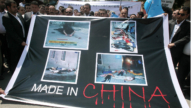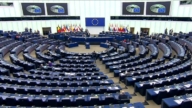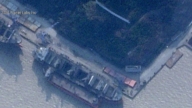【新唐人2014年11月10日訊】11月3號,中國公司贏得了墨西哥的一個高速鐵路項目。這被稱為中國高鐵真正意義上的「海外第一單」。但3天之後,墨西哥總統涅托在即將飛往北京、出席亞太經合組織(APEC)會議之前,突然宣佈取消招標結果,原因是招標過程受到了質疑。
當地時間6號晚間,墨西哥通信與交通部長魯伊斯•埃斯帕薩(Gerardo Ruiz Esparza)在Televisa Network的新聞節目上宣佈,總統涅托(Enrique Pena Nieto)剛剛決定撤回墨西哥城與克雷塔羅之間高鐵項目的中標結果,將重新招標。埃斯帕薩表示,總統撤銷這個合同是因為公共輿論對投標過程產生了「疑慮和擔憂」。
此前3天,這份超過37億美元的高鐵合同,被授予了由中國鐵建股份有限公司(簡稱中鐵建),和中國南車股份有限公司(簡稱中國南車)牽頭的唯一競標方。但政府這一決定招來了墨西哥國內輿論、尤其是反對黨的質疑。
英國《衛報》報導,墨西哥反對黨、國家行動黨的議員指責,這條高鐵項目的招標過程缺乏透明度,而且墨西哥政府向中國公司提供信息,來幫助中國企業投標。
在宣佈取消投標結果前幾小時,墨西哥通信與交通部長埃斯帕薩還在為招標過程進行辯解稱:「只有一個投標方並不奇怪,通常此類大型項目平均也只有兩個投標方。」
但就在墨西哥總統涅托即將前往北京參加亞太經合組織(APEC)領導人會議之前,這一招標結果突然被取消。
對此,紐約城市大學政治學教授夏明表示,這與涅托政府所面臨的國內壓力有關。夏明談到,墨西哥執政黨——革命制度黨曾失去執政地位長達10幾年,重新上臺也不過兩年時間。
紐約城市大學政治學教授夏明:「革命制度黨它本身它的腐敗問題也很嚴重,所以在這種情況下,反對黨想利用這個機會對革命制度黨進行強烈的批評。我覺著這是直接的一個重要的原因。」
夏明分析,涅托總統之所以在亞太經合組織領導人會議之前取消中方中標,也可能是一種向中方施壓的談判戰略。墨西哥政府通過此舉告知中共當局:「自己受到反對黨、議會的牽制,從而希望在談判中獲得中方的更多讓步。」
《華爾街日報》報導,在招標過程中,日本三菱、法國阿爾斯通、德國西門子和加拿大龐巴迪等公司都曾表示對該項目有濃厚興趣,但因招標時間只有兩個月而無法按時遞交標書。這幾家公司曾要求墨西哥政府延長競標時間,但遭到拒絕。
美國中文雜誌《中國事務》總編輯 伍凡:「你這樣的做法,不公開、不透明,其他國家也抗議。墨西哥的反對黨和總統之間又擺不平,這事情就鬧開了。不管怎麼講,這件事情暴露出來:中共是不惜工本,為了要把這個生意拿下來,想盡一切辦法把它(中國高鐵)推出去。」
《華爾街見聞》網報導,中國鐵路企業海外拓展主要是靠打價格牌,但即使拿下了墨西哥高鐵項目,中鐵建依然面臨很大的財務風險。2009年中鐵建承建了沙特輕軌,結果因延誤工期而虧損了41億多元。
《美國之音》中文網報導,中鐵隧道集團副總工程師王夢恕曾號稱:「中國高鐵優質。而實際上,近年來中共當局為刺激經濟而大力發展高鐵,由此而來的卻是事故不斷、問題連連。前鐵道部長劉志軍等中共官員更因貪腐嚴重而落馬入獄。」
夏明:「高鐵建設出現是在大概5年到10年不到的時間,卻出現了大規模的一些問題,無論是質量問題,還是高鐵建設工程的軌道、地基等等問題。所以我覺得,如果要說中國高鐵是優質的話,恐怕現在很難證明。」
據報導,連接墨西哥首都和第3大城市克雷塔羅的這條高速鐵路,總長210公里,設計時速在300公里以上。項目包括線路設計、施工、高速動車組的設計製造、線路調試和5年的運營維護。工程原計劃在明年2月開工,2018年通車運營。
採訪/易如 編輯/李謙 後製/李智遠
Mexico Abruptly Canceled High-speed Rail Deal With The CCP
On Nov. 3, Mexico’s first high-speed rail construction deal
was awarded to a Chinese-led group.
It was called “the first overseas order"
for China’s high-speed railway industry.
However, only three days later, Mexico president
Enrique Pena Nieto abruptly canceled the deal right before
his departure for Beijing to participate
in the Asia-Pacific Economic Cooperation (APEC) summit.
The cancellation was due to “serious doubts, questions,
worries about the legality and transparency
of this bidding process."
This is quite a shock to China’s high-speed railway industry
which is ambitious in overseas expansion.
At 6 p.m. local time, Gerardo Ruiz Esparza, Mexico Minister
of Communications and Transportation, announced
on a TV news program that President Nieto just decided
to cancel the tender of high-speed rail plan between
Mexico City and Queretaro and added that
the bidding process would be restarted.
Esparza said the cancellation was made because the public
had “serious doubts and worries" about the bidding process.
Just three days prior, the $3.75 billion bullet train contract
was awarded to the sole bidder, a group led by the China
Railway Construction Corp. and CSR Corporation Limited.
However, the result was then seriously questioned
by Mexico media and the opposite party.
A Guardian report said opposition politicians criticized
the bidding process as having lacked transparency
and legitimacy, as Mexico government had offered tips
to help the Chinese-led group win the bid.
Several hours before the cancellation was announced,
Esparza was still defending the bidding process.
Esparza said it was not unusual to have only one bidder,
as big projects like that normally
had no more than two bidders.
However, right before president Nieto left for Beijing
to attend the APEC summit, the cancellation announcement
was released.
Xia Ming, professor of political science at CUNY,
said the cancellation resulted from domestic pressure
over Nieto administration.
Xia introduced that, the current ruling party Institutional
Revolutionary Party (PRI) had lost its power
for over a decade.
It is only two years since PRI took power again in Mexico.
Xia Ming, CUNY professor of political science: “PRI has
serious corruption problems.
In such a situation, the opposition party will take
the opportunity to seriously attack PRI on corruption issues.
I think this is a key factor that led to cancellation of the deal."
Xia Ming said it could be a strategy to press the Chinese
Communist Party (CCP) for Nieto to cancel the tender right
before his visit to China.
Mexico government may attempt to release a signal
to the CCP that the plan is hampered by oppositions,
such as to push the CCP to making more concessions
in negotiating about the deal.
According to the Wall Street Journal, Mitsubishi (Japan),
Alstom (France), Siemens (Germany) and Bombardier
(Canada) all showed interests in Mexico’s high-speed
rail project.
However, they could not complete bidding documents
in only two months of bidding period.
Those companies had requested for extension
of bidding time but got denied.
Wu Fan, editor-in-chief of China Affairs magazine: “A process
like that is neither open nor transparent.
Other countries will not accept it.
Along with battle between Mexico president and oppositions,
the problem becomes a real one.
In any case, the story clearly reveals how the CCP attempts
to win the project by all means, such as to promote
its high-speed rail to global market."
Wallstreetcn.com reported that the CCP mostly promoted
its high-speed rail industry with low prices.
However, the China Railway Construction Corp. (CRCC)
will still face serious financial risks even
if it eventually wins the Mexico project.
In 2009, CRCC won the contract to build a light rail
in Saudi Arabia.
However, it resulted in a deficit of $670 million
(4.1 billion Yuan) due to construction delay.
A Voice of America (VOA) quoted Wang Mengshu,
deputy chief engineer with China Railway Tunnel Group,
who claimed “China’s high-speed rail is excellent in quality."
But the fact is accidents had frequently occurred
under the CCP’s hasty development of high-speed rail
in seeking economic growth.
Liu Zhijun, former minister for railway, had been put
into prison for extremely serious corruption.
Xia Ming: “The CCP only started to build high-speed railways
less than ten years ago, but there have been some
big problems in construction quality, such as in rail tracks
or groundwork.
So personally I think it is hard to prove right away
that the CCP’s high-speed rail is of high quality."
The high-speed rail connecting Mexico City and Queretaro,
the third largest city in Mexico, is 210 kilometers long,
and is designed to be operated at maximum speed
of over 300 kilometers per hour.
The project includes route design, construction, design
and manufacturing of bullet trains, route commissioning
and five year operation and maintenance.
The construction was originally planned to begin
in February 2015 and complete in 2018.
Interview/YiRu Edit/LiQian Post-Production/Li Zhiyuan




























